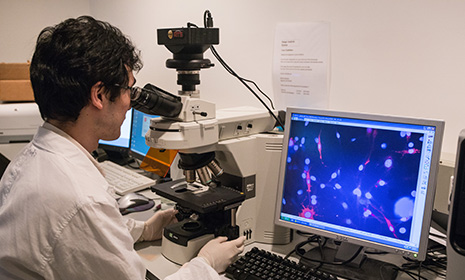Montero, David

Division of Kinesiology
- PhD
Biography
Professor David Montero joined the School of Public Health at the University of Hong Kong in 2020. His research group recognises that the human machine is not yet understood — some functions have not even been questioned. Human experimentation is essential, much remains to be done. They welcome challenging questions arising the necessary intrinsic motivation to be immersed in them. The scope of the research group can be best appreciated by reading their publications. Their work is regularly published in highly ranked journals in basic and clinical fields.
Selected Publications
- Guo M, Liu X, Dixon S, Tse HF, Montero D. Effects of angiotensin II receptor type 1 blockade combined with endurance training on hemoglobin mass and aerobic capacity: a randomized placebo-controlled trial. Cardiovascular Research 2025.
- Gunawardana D, Guo M, Montero D. Lean body mass associates with a hypertensive cardiovascular phenotype in men but not in women. J Cachexia Sarcopenia Muscle 2025.
- Meihan Guo, Montero D. Did you know? Does calcium supplementation negate erythropoiesis with endurance training? Acta Physiol 2025.
- Montero D. The physiology of aerobic capacity in women (book). Editorial: Routledge, Taylor & Francis Group. 1st edition: 20.12.2024. ISBN: 9781032776934.
- Guo M, Montero D. Medium-Term Effects of Increased Water Intake and Head-Up Sleep on Cardiovascular Health. JACC Adv 2024.
- Guo M, Montero D. Hans Chinese consume less O2 for muscular work than European-American. Mil Med Res 2024.
- Guo M, Montero D. Did you know? Is there a reserve in myocardial work via the Frank-Starling mechanism in healthy humans? Acta Physiol 2024.
- Guo M, Montero D. Women consume less oxygen than men for muscular work: role of lean body mass. Mayo Clinic Proc 2024.
- Montero D. The carotid baroreflex: the ultimate hemodynamic factor limiting aerobic capacity? J Physiol 2024.
- Guo M, Diaz-Canestro C, Montero D. The Frank-Starling mechanism is not enough: blood volume expansion prominently decreases pulmonary O2 uptake. Mil Med Res 2024.
- Guo M, Diaz-Canestro C, Pugliese NR, Paneni F, Montero D. Lean Body Mass and the Cardiorespiratory Phenotype: an Ethnic-Specific Relationship in Hans Chinese Women and Men. J Cachexia Sarcopenia Muscle 2024.
- Diaz-Canestro C, Tse HF, Yiu KH, Montero D. Reduced lean body mass: a potential modifiable contributor to the pathophysiology of heart failure. Eur Heart J 2023.
- Meihan Guo, Candela Diaz-Canestro, Ming Ng, Kai Hang Yiu, Montero D. The Chinese cardiorespiratory and circulatory system at work in women and men: a case-control study. Lancet Reg Health West Pac 2023.
- Guo M, Diaz-Canestro C, Montero D. Blood volume explains the relationship of lean body mass with the cardiovascular system in men but not in women. Mayo Clinic Proc 2023.
- Diaz-Canestro C, Pentz B, Sehgal A, Yang R, Xu A, Montero D. Lean body mass and the cardiovascular system constitute a female-specific relationship. Sci Transl Med 2022.
- Diaz-Canestro C, Pentz B, Sehgal A, Montero D. Sex differences in cardiorespiratory fitness are explained by blood volume and oxygen carrying capacity. Cardiovasc Res. 2021.
- Diaz-Canestro C, Montero D. Blood volume primarily determines orthostatic tolerance in women. J Intern Med 2021.
- Diaz-Canestro C, Siebenmann C, Montero D. Blood oxygen carrying capacity determines cardiorespiratory fitness in middle-aged and older women and men. Med Sci Sports Exerc 2021.
- Diaz-Canestro C, Sehgal A, Pentz B, Montero D. Sex specificity in orthostatic tolerance: the integration of hematological, cardiac and endocrine factors. Eur J Prev Cardiol 2021.
- Diaz-Canestro C, Pentz B, Sehgal A, Montero D. Sex dimorphism in cardiac and aerobic capacities: the influence of body composition. Obesity 2021.
- Diaz-Canestro C, Montero D. Unveiling women's powerhouse. Exp Physiol 2020.
- Montero D, Diaz-Canestro C, Oberholzer L, Lundby C. The role of blood volume in cardiac dysfunction and reduced exercise tolerance in patients with diabetes mellitus. Lancet Diabetes Endocrinol 2019.
- Lundby C, Montero D. Did you know - why does maximal oxygen uptake increase in humans following endurance exercise training? Acta Physiol (Oxf) 2019.
- Diaz-Canestro C, Montero D. Sex dimorphism of VO2max trainability: a systematic review and meta-analysis. Sports Medicine2019.
- Montero D, Diaz-Canestro C. Body height is inversely associated with left ventricular end-diastolic pressure in heart failure with preserved ejection fraction. Eur J Prev Cardiol 2019.
- Montero D, Lundby, C. Arterial O2 content regulates plasma erythropoietin independently of arterial O2 tension: a blinded crossover study. Kidney Int 2018.
- Montero D, Lundby, C. Regulation of red blood cell volume with exercise training. Compr Physiol 2018.
- Montero D, Madsen K, Meinild-Lundby AK, Edin F, Lundby C. Sex dimorphism of substrate utilization: differences in skeletal muscle mitochondrial volume density and function. Exp Physiol 2018.
- Montero D, Breenfeldt-Andersen A, Oberholzer L, Haider T, Goetze JP, Meinild-Lundby AK, Lundby C. Erythropoiesis with endurance training: dynamics and mechanisms. Am J Physiol Regul Integr Comp 2017.
- Montero D, Lundby C, Ruschitzka F, Flammer A. True anemia ―red blood cell volume deficit― in heart failure: a systematic review. Circ Heart Fail 2017.
- Montero D, Flammer A. Exercise intolerance in heart failure with preserved ejection fraction: time to scrutinize diuretic therapy? Eur J Heart Fail 2017.
- Montero D, Lundby C. Refuting the myth of non-response to exercise training: ‘non-responders’ do respond to higher dose of training. J Physiol 2016.
- Montero D, Houben AJ, Koster A, Muris DM, Schram MT, Gronenschild EH, Sep SJ, Henry RM, van der Kallen CJ, Schaper NC, Dagnelie PC, van Geel TA, Kremers SP, Savelberg HH, Stehouwer CD. Physical activity is associated with glucose tolerance independent of microvascular function: the Maastricht Study. JCEM 2016.
- Montero D, Rauber S, Goetze JP, Lundby C. Reduction in central venous pressure enhances erythropoietin synthesis: role of volume-regulating hormones. Acta Physiol (Oxf) 2016.
- Montero D, Diaz-Cañestro C, Keiser S, Lundby C. Arterial stiffness is strongly and negatively associated with the total volume of red blood cells. Int J Cardiol 2016 June 27.
- Montero D, Cathomen A, Jacobs RA, Flück D, Leur J, Keiser S, Bonne T, Kirk N, Lundby AK, Lundby C. Haematological rather than skeletal muscle adaptations contribute to the increase in peak oxygen uptake induced by moderate endurance training. J Physiol 2015.
- Montero D, Diaz-Cañestro, C. Endurance training and VO2max with ageing: role of maximal cardiac output and oxygen extraction. Eur J Prev Cardiol 2015.








.png)
